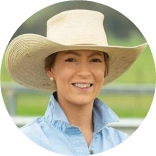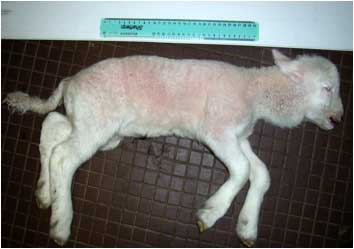Be on the lookout for goitre in lambs
06 Sep 2021
 PRODUCTION ADVICE - SEPTEMBER 2021 - ANIMAL BIOSECURITY & WELFARE
PRODUCTION ADVICE - SEPTEMBER 2021 - ANIMAL BIOSECURITY & WELFARE
By Eve Hall
District Veterinarian
M: 0439 078 989 | E: eve.hall@lls.nsw.gov.au
Sheep producers in the region’s east should be on the lookout for signs of goitre, a condition of newborn lambs that occurs as a result of iodine deficiency in the pregnant ewe. Iodine is found mostly in the soil, so the good rain experienced over autumn and winter may have resulted in some leaching of soils in the region. Abundant pasture growth also means that soil intake by pregnant ewes may have been limited.
A lack of iodine results in enlargement of the thyroid glands, and lambs with goitre typically present with a swelling under the throat area. Affected lambs are often born weak and can be very susceptible to cold, leading to a significant increase in lamb mortality.

A lamb with throat swelling - a typical sign of goitre.
Photo: http://www.flockandherd.net.au/sheep/reader/goitre.html
An outbreak of goitre can be challenging to manage as treatment of affected lambs is rarely useful, and once the problem has been identified at lambing it is often too late to begin supplementing the ewes with iodine.
Prevention can be readily achieved by supplementing pregnant ewes in their third and fourth months of pregnancy. Ewes may be drenched with a cheap potassium iodine solution. Iodised salt blocks may be of some value, although intake can be less reliable. Supplementation should especially be considered in good rainfall seasons, and in areas with known marginal soil iodine.
Iodine deficiency also occurs in humans and having adequate quantities in pregnancy is critical. If you are interested in learning more, there is a great interview between Professor Creswell Eastman and Richard Fidler that is well worth a listen.
If you are experiencing higher-than-normal lamb mortality or suspect you may have lambs with goitre, you can contact your nearest District Vet to discuss further: Albury 02 6051 2200 or Deniliquin 03 5881 9900.